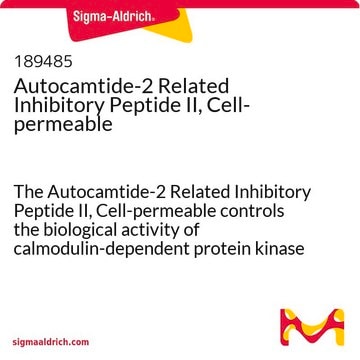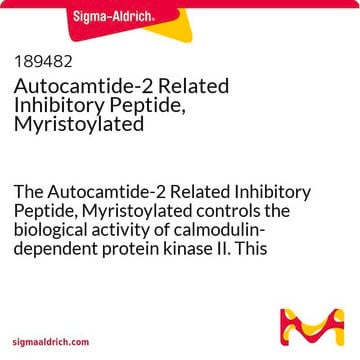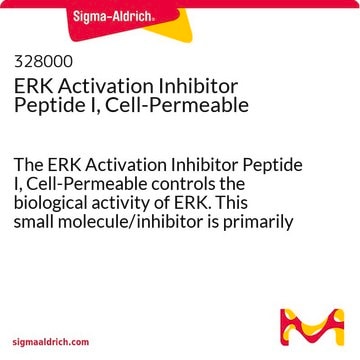SCP0001
Autocamptide-2 Related Inhibitor Peptide
Synonym(s):
AIP
Sign Into View Organizational & Contract Pricing
All Photos(1)
About This Item
Empirical Formula (Hill Notation):
C78H142N22O20
Molecular Weight:
1708.10
UNSPSC Code:
12352202
NACRES:
NA.32
Recommended Products
Assay
≥95% (HPLC)
form
lyophilized
composition
Peptide Content, ≥70%
storage condition
protect from light
storage temp.
−20°C
Amino Acid Sequence
Myr-Lys-Lys-Ala-Leu-Arg-Arg-Gln-Glu-Ala-Val-Asp-Ala-Leu
Application
Autocamptide-2 Related Inhibitor Peptide (AIP) is highly specific inhibitor of calmodulin-dependent protein kinase II (CaMKII) that may be used to study the role of CaMKII in processes such as heart failure.
Storage Class Code
11 - Combustible Solids
WGK
WGK 3
Flash Point(F)
Not applicable
Flash Point(C)
Not applicable
Certificates of Analysis (COA)
Search for Certificates of Analysis (COA) by entering the products Lot/Batch Number. Lot and Batch Numbers can be found on a product’s label following the words ‘Lot’ or ‘Batch’.
Already Own This Product?
Find documentation for the products that you have recently purchased in the Document Library.
Wei Zhang et al.
Journal of cardiovascular pharmacology, 55(1), 96-105 (2009-11-26)
Calcium-calmodulin-dependent protein kinase II (CaMKII) is one of the main protein kinases mediating intracellular Ca changes. It is also involved in the process of cardiac diseases, such as cardiac hypertrophy, but its effects on myocardial fibrosis remain unclear. The present
Vassilios J Bezzerides et al.
Circulation, 140(5), 405-419 (2019-06-04)
Catecholaminergic polymorphic ventricular tachycardia (CPVT), an inherited cardiac arrhythmia characterized by adrenergically triggered arrhythmias, is inadequately treated by current standard of care. Ca2+/calmodulin-dependent protein kinase II (CaMKII), an adrenergically activated kinase that contributes to arrhythmogenesis in heart disease models, is
CaMKII inhibition in heart failure makes jump to human.
Donald M Bers
Circulation research, 107(9), 1044-1046 (2010-10-30)
Keiichi Odagiri et al.
Journal of molecular and cellular cardiology, 46(6), 989-997 (2009-03-26)
Calmodulin (CaM) and Ca(2+)/CaM-dependent protein kinase II (CaMKII) play important roles in the development of heart failure. In this study, we evaluated the effects of CaM on mitochondrial membrane potential (DeltaPsi(m)), permeability transition pore (mPTP) and the production of reactive
A Ishida et al.
FEBS letters, 427(1), 115-118 (1998-06-05)
The importance of the individual amino acid residues of AIP (KKALRRQEAVDAL), a highly specific inhibitor of calmodulin-dependent protein kinase II (CaMKII), was studied. Replacement of Arg6, Gln7, or Ala9 by other amino acid residues produced a marked increase in the
Our team of scientists has experience in all areas of research including Life Science, Material Science, Chemical Synthesis, Chromatography, Analytical and many others.
Contact Technical Service






